- Home
- Alan Scholefield
Dirty Weekend (Macrae and Silver Book 1)
Dirty Weekend (Macrae and Silver Book 1) Read online
DIRTY WEEKEND
A T Scholefield
© A T Scholefield 1990
A T Scholefield has asserted his rights under the Copyright, Design and Patents Act, 1988, to be identified as the author of this work.
First published in 1990 by MACMILLAN LONDON LIMITED.
This edition published in 2017 by Endeavour Press Ltd.
Table of Contents
Chapter One
Chapter Two
Chapter Three
Chapter Four
Chapter Five
Chapter Six
Chapter Seven
Chapter Eight
Chapter Nine
Chapter Ten
Chapter Eleven
Chapter Twelve
Chapter Thirteen
Chapter Fourteen
Chapter Fifteen
Chapter Sixteen
Chapter Seventeen
Chapter Eighteen
Chapter Nineteen
Chapter Twenty
Chapter Twenty-One
Chapter Twenty-Two
Chapter Twenty-Three
Chapter Twenty-Four
Chapter Twenty-Five
Chapter Twenty-Six
Chapter Twenty-Seven
Chapter Twenty-Eight
Chapter Twenty-Nine
Chapter One
The men who had come for Jack Benson were waiting near the eighteenth green of the Royal Hong Kong Golf Club.
Come for.
His brain used the phrase, not because it was an understatement and he could not face the truth, but because it was correct. Come for. Not kill. That would happen later.
First, as was the Chinese way with those who owed money and could not pay, they would hold him down and cut off a finger or an ear: a warning shot across his bows, so to speak.
If, when the wound had healed he still had not found the money, there would be a road accident, or a boating accident, or a swimming accident – and goodbye Jack, dear old sport.
He’d seen it happen before. Only last month the chairman of the International and Oriental Bank had been found in the deep end of his own swimming pool with a manhole cover wired to his neck. It was well known that he had come badly unstuck in a development deal in Central.
The eighteenth hole on the Old Course at Fan Ling is a dog-leg to the left. A good tee shot gives a view of the clubhouse terrace and the practice putting green, and Jack Benson had hit a good drive.
It takes approximately ten minutes to play a long hole in golf and, give or take a few seconds, about three minutes to drive, walk to your ball, and whack it a second time.
During those three minutes, from the moment Benson struck his drive down the middle, to the time he reached his ball, he knew (a) that Mr Shao Li-tze, with whom he was playing this round – the last, as it transpired, he would ever play at Fan Ling – was not going to buy his excuses, and (b) that the two men were waiting for him.
He might not have connected the one standing on the empty putting green, but the other was conspicuous. You don’t normally see casual strollers standing by the eighteenth green looking down the fairway through binoculars. The glasses were pointed straight at Benson. And Mr Shao was just too casual.
To say that he was afraid would be to err on the side of understatement. He had been afraid for months now, in fact ever since he had first read in the South China Morning Post that some of the Chinese students arrested after the Tiananmen Square peaceful revolution had been executed.
Even then, even after the executioners from the Peoples’ Liberation Army had placed the pistols at the back of the students’ heads and pulled the triggers, he had continued to hope and be afraid by turns. Benson was, after all, an optimist. Everyone said so. And things had usually worked out for him. But not this time. The luck, as Hemingway had written, she had run out.
For, from the moment those executions took place, Hong Kong got the jitters. The money markets, the share markets, the commodity markets and the Hang Seng Index, had all gone into terminal decline. The thinking was simple: if the Chinese were doing this to their own people who had had only the faintest whiff of democracy, what were they likely to do to a freedom-loving Hong Kong when they took it back from Britain in 1997?
He was, Benson told himself, a victim of history. And, if he wasn’t careful, this Chinese upheaval was going to cost him an ear and then his life, for there was no way he was ever going to find forty million Hong Kong dollars by the end of the Easter weekend. No way at all.
He had used the money he had borrowed from the bank against the business. He had used the unsecured loan from Mr Shao. He had even used some of his own money, because the deal was absolutely one hundred per cent cast-iron and copper-bottomed. It would make him more money than he could count. He would never have to work again in his life.
And everything had looked so good. First, Mrs Thatcher had come out and struck a deal with China over Hong Kong. Then Gorbachev had arrived to cement the new friendship that was breaking out all over. And then a lot of bloody twits, students for Christ’s sake, who should have been reading books and smoking pot, suddenly started to play at being grown-ups – and screwed everything up. What a mess!
As Benson struck his drive down the eighteenth, he came to the considered opinion that history, politics, and the international situation were not worth dying for.
He was forty-three years old, of medium height with dark wavy hair and a square, good-looking face. One he had been slim but years of the good life, or his version of it, had given him a small belly that overflowed the top of his pants, and a slight mottling of broken veins on his cheeks. But he was still a man who turned women’s heads when he walked into a restaurant.
Mr Shao by comparison was twenty years older. He had had smallpox as a child and his face was pitted with craters. But he was as thin as a rail and looked fit enough to run up and down the Kowloon hills – which he often did. For years he had kept in trim by playing tennis and squash on his own courts. He liked to keep healthy, for it would give him longer on Earth to be with his money. The only game Mr Shao could not play, as far as Benson knew – or thought he knew – was golf.
He had played Mr Shao twice before, and both times had purposely lost to him. He knew it. Mr Shao knew it. The caddies knew it. It has caused Mr Shao to lose face.
They had not played for nearly a year. Benson had played little in that time and his eight handicap had drifted upwards through lack of practice. But Mr Shao had had lessons four times a week for six months and was matching Benson stroke for stroke and hole for hole. It had become important for Mr Shao to beat Benson and they both knew it.
But, in the three minutes it took Benson to reach his ball lying in the middle of the eighteenth fairway – during which time he had seen the two men and considered China’s past, present, and his own future – he no longer gave a toss who won or lost.
They had not taken caddies because when they set off on their round in the late morning there were no ‘A’ caddies remaining and neither wanted the hassle of a ‘B’ caddy. But, more importantly, Benson had not wanted to be overheard. Caddies in Hong Kong were a rich source of information after carrying bags for two talkative businessmen, especially when the deals were on the shady side as they so often were.
Like Mr Shao, Benson was pulling a trolley. The late spring day was hot and the humidity high. He was drenched in sweat.
By comparison, Mr Shao, in fawn sportswear and a Sinatra straw hat, was cool and composed. It seemed incredible, Benson told himself, that it would be this man who would receive the finger or the ear. How would it be presented to him? Gift-wrapped?
Benson waited f
or Mr Shao to play his shot. He played safe, percentage golf.
Benson said, ‘Good one.’
Mr Shao was away to his left and Benson was able to shield his ball from Mr Shao’s view. He swung. At the last moment he let his right hand take over. The club head met the ball and cut across it. The ball rose, curved away in a heavy slice and disappeared into the trees.
‘Too bad,’ Mr Shao said.
Benson went off in the direction of his ball.
‘Careful of bamboo snakes,’ Mr Shao called after him. ‘They coming out now from winter sleep.’
‘I’ll be careful.’
He left his trolley on the edge of the fairway and entered the rough. It was thick, bushy. He had taken a six-iron in his hand just in case there was a snake. It wasn’t the moment to be bitten.
He pushed his way through the branches and leaves to the point where his ball might have dropped. He was out of sight of Mr Shao now. He went on walking.
He walked through the rough until he reached a point where he was also out of sight of the car park and the clubhouse and where a road cut through the golf course. He began to run.
He had no precise idea of what he was going to do, only that he had to get away. He had thought he might stop a car, hitch a ride, but then, like some providential gift, he saw a green New Territories taxi. It was empty. He stopped it. The driver had no wish to go into Central. Benson offered him twice the fare.
The driver shrugged. The gweilos sometimes did these strange things. ‘OK,’ he said.
*
It took Benson the better part of ten minutes to calm down and take stock of things. His heart was still jerking in his chest but not as badly as it had been. He already had high blood pressure, Cod knew what this would do to it. He mopped his face with his handkerchief and dried his forearms and hands.
They wound down past Tai Po and Tolo harbour and then the racecourse at Shatin where he’d backed so many losers.
He wondered what Mr Shao was doing now. He would have waited for Benson at the eighteenth green, and then, when he did not reappear, would have walked back along the fairway and into the rough to help Benson look for his ball.
There was no reason why Mr Shao should have been suspicious of anything.
When he did not find Benson among the acacias and eucalyptus, he’d search the clubhouse terrace, then the car park. He’d see Benson’s Mercedes. Being bright yellow it was difficult to miss. Then back to the clubhouse, the locker rooms and the bars. By then he would probably have sent his two minders back down the eighteenth to the seventeenth. After drawing a blank Mr Shao would probably go to the secretary’s office and ask there.
The whole thing would take half an hour, perhaps longer. And then? Then they’d probably postpone any further moves until after dark. They’d come to his apartment in Stanley, and they’d find it fully furnished and fully provisioned. Clothes still hanging in the closets. Only no one would be there, for this was the way he had planned it if things went wrong.
It was a lovely apartment, the best he’d ever had, with views of the South China Sea which would never be repeatable. Nor, of course, would the women.
He told himself they wouldn’t rush. There was no need to. As far as they were concerned Benson wasn’t going anywhere.
How had he got into a situation like this? He’d always thought that financially Hong Kong would do for him what London and New York never had. Always wheeling, always dealing, always planning. Jesus!
Before they entered the Cross Harbour Tunnel they were passed by another taxi full of Australians clutching flags and cans of lager. And then he remembered that the International Rugby Sevens tournament had finished two days earlier.
He used to go with Richard. It was a kind of tradition; Richard coming out each March and making up a party. One year Maria had come with Richard. Jack had taken . . . Lisa, or Joan, or Mei-Li, or . . . the names escaped him now.
Pity about Richard, but what the hell. It was every man for himself in this life.
They came up into daylight again and stopped at his office on Des Voeux Road, Central. For a moment he thought of asking the driver to wait, but he knew he’d get an argument and he didn’t have time. He paid and went up to the twenty-third floor.
A glass door on the left side of the foyer said dunlap & benson among several of his agencies. This was the only one with his own name on it; the only one in which he had a real share. One day, if he’d kept his nose clean and worked hard, it might have made him moderately well-off. But the word ‘moderate’ had never interested Benson and already he was thinking of it in the past.
He went into the outer office. His secretary, Mrs Feniman, looked up from her desk and said, ‘You finished early.’
‘The course was empty.’
She was in her mid thirties, the English wife of a Ministry of Works official. Good-looking in a pale, ethereal way. She wore long chiffon dresses and pale make-up. After an office party two Christmasses before, he had taken her home in a taxi and tried to make her and she’d gently untangled herself and said, ‘Don’t be crude, Jack.’
He’d been angry at the time. Then, after he had sobered up, he had wondered how she would react at work, but she had never referred to it again either by word or look.
‘I was going to make some tea,’ she said, rising and floating towards the little kitchenette.
‘I’d love some.’
Benson’s suite had a small bathroom and a built-in wardrobe. He showered and changed quickly and Mrs Feniman brought him his tea.
He locked the inner door and opened a large wall safe. It contained a soft leather hold-all. He opened it and took out his passport and an open-date airline ticket to London, the rest of the bag was filled with money. There was the equivalent of a quarter of a million sterling in US dollars, Swiss francs, German marks and British pounds, with a couple of thousand Hong Kong dollars on the side.
In terms of what he owed it was not a lot, but it would give him a new start wherever he chose to make one. It would also support him in some style in London until that new start could be negotiated. He put the passport and ticket in the top pocket of his dark blue linen sports shirt, took his cup into the outer office and said, ‘Seconds?’
Mrs Feniman smiled palely and said, ‘I’ll make some fresh.’
She went back into the kitchenette, as he knew she would. He picked up the bag, quickly crossed to the outer door then called, ‘I’ll be back in a minute, I’m going to get some cigarettes.’
On the street, he thought: no cabs this time, don’t leave a trail. So he caught the Star Ferry to Kowloon. It ploughed out into the choppy waters and he felt the cool breeze on his body.
He wondered if they would find the New Territories taxi driver or what they would do to Mrs Feniman. He hoped they wouldn’t hurt her.
On the Kowloon side he felt safe enough to pick up a cab. ‘Kai Tak,’ he said.
Although a plane lands at Kai Tak Airport every three minutes, the terminal is run with the same dedicated efficiency as Hong Kong’s business life. Today it was more than usually crowded as the rugby supporters took their flights home.
There were Australians, New Zealanders, British, French and Irish – many of whom were partly drunk. Benson went straight to the British Airways desk. There was a long stand-by queue. And an even longer one at Cathay Pacific. He studied the departures board with care, for there were never flight announcements at Kai Tak.
As he stood there he began to feel afraid again. He thought people were looking at him, registering his face, remembering him.
In the next thirty minutes there were departures to Jakarta, Manila and Perth. If he had to disappear, neither Jakarta nor Manila seemed like good ideas. Not with a white skin. Perth, then.
He went over to Qantas. There was one seat left. He suddenly remembered that the only money he had, except for change, was in the hold-all. He couldn’t open it now. He thought of going to the lavatories, locking himself in and opening it there.<
br />
But the departure light was flashing and someone else was queueing behind him. So he paid by American Express. Even as he did so he knew it was a mistake.
He had to run the last few yards to the departure gate and then he was being shown his seat in Smoking. Everywhere he looked there were Chinese and Japanese faces. They seemed to be staring at him.
He took his seat and the hostess said, ‘Your bag, sir.’
‘No, I want it with me.’
‘I’m sorry.’
‘No!’
Next to him an Australian rugby supporter wearing an orange rosette looked at him oddly.
‘It’s got to be stowed for take-off, sir. You can put it under your seat.’
‘Oh. OK.’
He put the bag on the floor and gripped it between his feet.
‘Where you making for?’ the Australian said.
‘Iceland.’
The man paused for a moment and then laughed. ‘You’re taking the long way round, sport.’
‘I’m sorry. I don’t speak English.’
He leaned back. His whole body had begun to shake.
Chapter Two
Terry was only truly happy when he was running. And he was running now. One foot after another, his soft-soled trainers making a light thud . . . thud . . . thud . . . on the cold London pavements.
Day . . . lee . . . Day . . . lee . . . Day . . . lee . . .
He kept up the rhythm of his running. Left . . . right . . . left . . . right . . . Day . . . lee . . . Day . . . lee . . . The Thames was behind him and he ran up Northumberland Avenue and into Trafalgar Square, a boy of fourteen, small for his age, dressed in a green and black track suit and a phosphorescent green woollen beanie.
The evening rush-hour was in full swing. People pushed and shoved and nearly bumped into him. But Terry was agile. He swerved and jinked and ducked through the phalanxes of office workers at bus queues.
They looked at him curiously. Everyone looked at him. Or so he thought. Could they see the blood? The fingers of his right hand were sticky with it. The knife in his pocket was covered in it. Why were they looking at him? Were there traces of blood on his face?

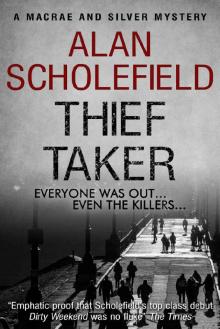 Thief Taker (A Macrae and Silver Mystery Book 3)
Thief Taker (A Macrae and Silver Mystery Book 3)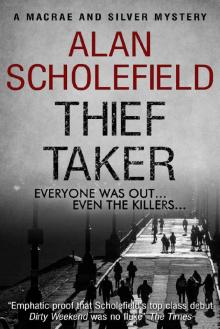 Thief Taker
Thief Taker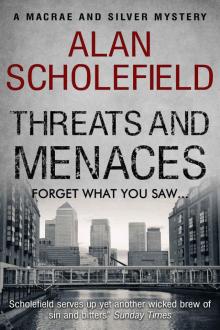 Threats and Menaces
Threats and Menaces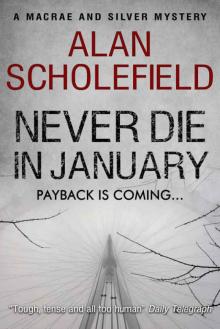 Never Die in January
Never Die in January Venom
Venom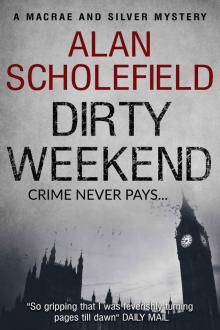 Dirty Weekend (Macrae and Silver Book 1)
Dirty Weekend (Macrae and Silver Book 1) Cat's Eyes
Cat's Eyes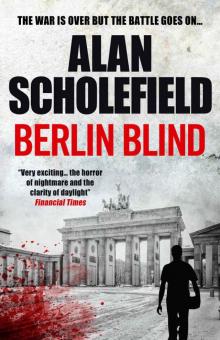 Berlin Blind
Berlin Blind The Sea Cave
The Sea Cave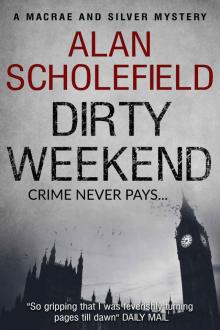 Dirty Weekend
Dirty Weekend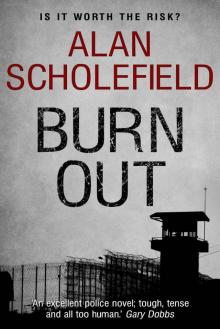 Burn Out (Dr. Anne Vernon Book 1)
Burn Out (Dr. Anne Vernon Book 1)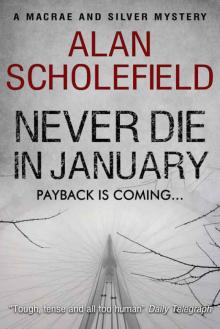 Never Die in January (A Macrae and Silver Mystery Book 2)
Never Die in January (A Macrae and Silver Mystery Book 2)